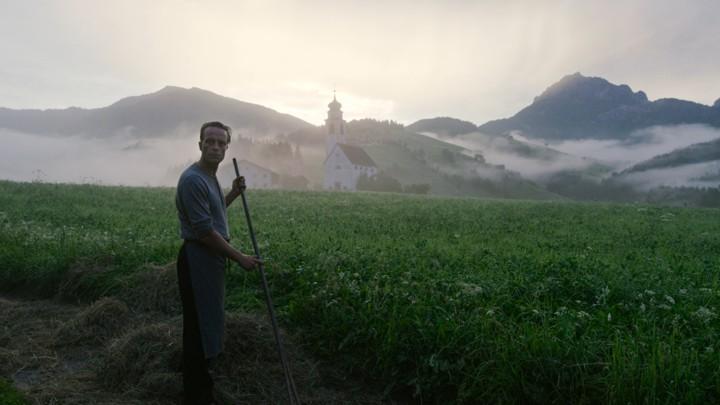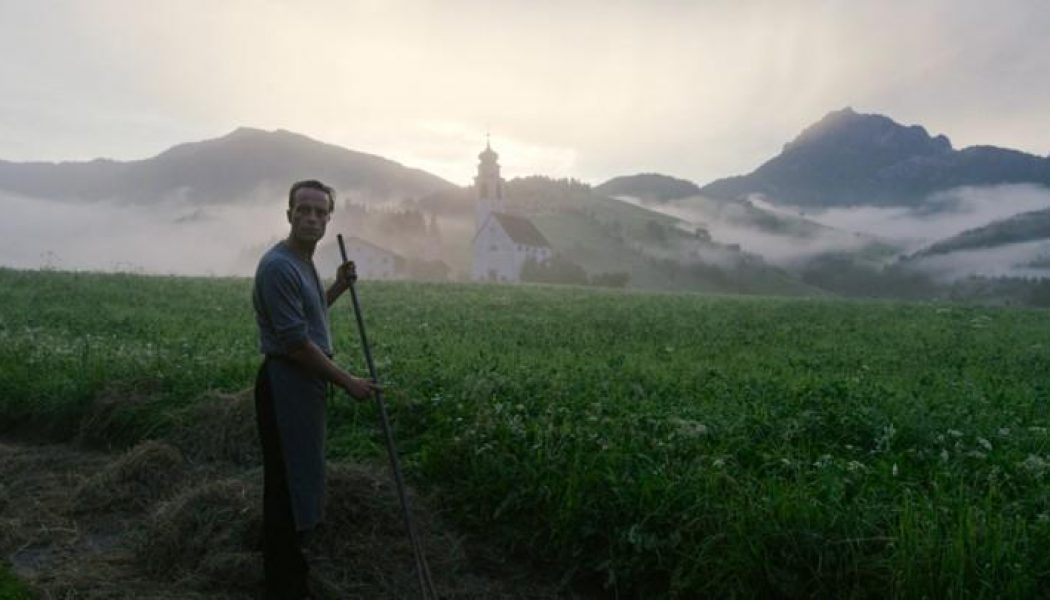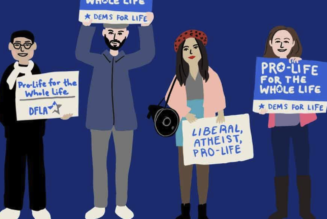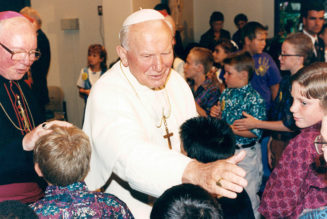
Last month, Fox Searchlight Productions released Terrence Malick’s new film A Hidden Life, about Austrian conscientious objector Franz Jägerstätter. Jägerstätter was executed in 1943 for refusing to fight for the German state. Malick’s film portrays the effects of this act of resistance, especially the devastating effects on Jägerstätter’s wife and his children. It is an important film which shows the real-life implications of resisting the state in a totalitarian world. The film shows us the great difficulty of holding to one’s principles in the face of draconian and violent punishment heaped upon those who refuse to participate in the state’s designs.
Unfortunately, the film’s subtlety and focus on the emotional states of the protagonists left many reviewers wondering what Jägerstätter’s motivations really were. One reviewer thought the movie was really about today’s politics, declaring the movie to be “a warning for 2019 America,” suggesting, ridiculously, that the Third Reich and the Anschluss are comparable to the modern American political milieu. Another critic recognized Jägerstätter’s religious motivations, but wondered about the details: “Jägerstätter acts, we’re told, because he is a good man and because of Christ’s example of self-sacrifice. That may be true, but we learn very little else about him.” Another critic declared the movie to be about “one person acting in conscience” without any reference to Jägerstätter’s religious views.
Given that the film does indeed leave much — perhaps too much to the imagination — rather than review A Hidden Life, it may be more useful to look at Jägerstätter in his own words.
Jägerstätter the Man
Jägerstätter, who would be declared a martyr by the Catholic Church and titled Blessed Franz Jägerstätter in 2007, had remained almost completely unknown outside his home village in the years following the war. Thanks largely to the work of sociologist Gordon Zahn, however, information on Jägerstätter has become increasingly accessible in recent decades. With the 2009 release of Franz Jägerstätter: Letters and Writings from Prison, edited by Erna Putz, English-speaking audiences now finally have firsthand access to the Austrian farmer’s religious and political thought.
Thanks to these writings, we find that Jägerstätter’s ideas of conscience were not vague or generalized. There were not based in modern secular ideas of enlightenment or popular notions of human rights. Rather, they were deeply rooted in the Christian gospels, and in his Catholic religious faith. It is even quite possible Jaegerstatter was encouraged in his anti-Nazi views both by the papal encyclical Mit Brennender Sorge (1937) and perhaps also by the anti-Nazi dissent of Jägerstätter’s local bishop Johannes Gföllner of Linz, who died in 1941.
A farmer with a rudimentary formal education, Jägerstätter had been the only one in his village to vote against the annexation of Austria by the German state. By 1943, Jägerstätter had already long been a critic of the Nazis, and was known to say “pfui Hitler” (read: “phooey!”) in response to “heil Hitler” from others in his village. Jägerstätter, who gave the impression of being an extremely run-of-the-mill farmer, was nonetheless unusual in his religiosity, and over time came to the conclusion that National Socialism was fundamentally incompatible with his faith. Although he was not inclined toward political activism, he was eventually forced into a position of resistance.
Made a citizen of the Reich against his will, Jägerstätter was drafted into the army and forced to take part in training exercises that took him away from his wife and his three young daughters for long periods of time. His experiences in the army only strengthened his resistance to the National Socialist war machine, and following a long series of delays and furloughs, Jägerstätter was ordered to report for combat duty in March of 1943. Concluding that he would not kill Poles or Russians for the glory of the German state, Jägerstätter reported for combat duty and declared that he would not fight. He was immediately arrested. In 1943, he was tried, convicted of treason and “demoralizing the troops,” and on August 9, 1943, at 4:00 PM he was executed by guillotine in Berlin-Brandenburg Prison.
The Nazi Creed
For a German or Austrian who was paying attention during this period, it was perhaps not difficult to see the inherent incompatibility between Nazism and Christianity. The notorious Nazi judge Roland Freisler, for example, had declared before the war that
Christianity and we are alike in only one respect: we lay claim to the whole individual. From which do you take your orders? From the hereafter or from Adolf Hitler? To whom do you pledge your loyalty and your faith?
Long before the Anschluss, in 1933, when such things could be said without risk of a lengthy prison term, Bishop Gföllner declared publicly that “Nazism is spiritually sick with materialistic racial delusions, un-Christian nationalism, a nationalistic view of religion, with what is quite simply sham Christianity.” Again in 1937, Gföllner stated that “It is impossible to be both a good Catholic and a true Nazi.” By 1941, though, even those who thought similarly remained silent out of fear. Gföllner was gone, and many assuaged their consciences by telling themselves Nazism was necessary to fight against the Communists.
Most Catholics — Like Most Austrians and Germans at the Time — Went with the Flow
The lack of outside reassurance did not daunt Jägerstätter. Writing in 1942, he referred back to Mit Brenender Sorge and concluded that since National Socialism is “even more dangerous than Communism,” the Christian was morally free to refuse military service: “Is it not more Christian for someone to give himself as a sacrifice than to have to murder others who possess a right to life on earth?” In such comments, typical for Jägerstätter, he was communicating a personal mode of thinking that was far more radical than the popular interpretation of political matters at the time.
In the introduction to Erna Putz’s edition of Jägerstätter’s texts, Jim Forest notes that,
if not a doctrine found in any catechism, it was widely believed [at that time in Europe] that any sins you commit under obedience to your government are not your personal sins but are regarded by God as the sins of those who lead the state.
In fact, this was precisely the advice Jägerstätter received from the new bishop of Linz, Joseph Fliesser, with whom Jägerstätter met to discuss the morality of his upcoming conscientious objection. According to Jägerstätter, the bishop may have feared that Jägerstätter himself was a Gestapo spy and preferred to not even discuss the matter, but he counseled in favor of obedience. Jägerstätter later commented, without anger, that “[t]hey don’t dare commit themselves or it will be their turn next.” But in response to the argument that one is not morally responsible for immoral acts he is ordered to do, Jägerstätter dissented.
According to Forest,
for Franz it seemed obvious that, if God gives each of us free will and a conscience, each of us is responsible for what we do and what we fail to do, all the more so if we are consciously aware we have allowed ourselves to become servants of evil masters.
Not allowing oneself to become a servant of “evil masters” was of particular importance to Jägerstätter. He repeatedly criticized his fellow members of the “German-speaking people” for allowing the National Socialists to take power. Referring specifically to the Catholic regions of Bavaria and Austria, Jägerstätter asked:
Are Austria and Bavaria blameless in that we now have a N.S. [National Socialist] state instead of a Christian one? Did National Socialism simply fall on us from the sky?
He went on:
I believe that the German-speaking people never participated as strongly in Christian charitable activities as they are now engaging in the N.S. organizations. Nor were they as ready to contribute their money to church programs.
Frequently in his writings, Jägerstätter referred to National Socialism as a “stream” that pulled so many people along in its current, and from which it was difficult to escape.
Jägerstätter’s Ideology of Political Resistance
The nature of this stream helped explain why so few resisted the National Socialist regime, for as Jägerstätter noted, there are many “who do not want to swim against the stream because to do so is more difficult than to allow oneself to be washed along by the waves.” Yet in Jägerstätter’s mind, resistance was always possible no matter how strong the current of the stream might be. No matter how difficult, Jägerstätter wrote that resistance would be worth it:
Many among us have already died, though not for Christ but for a N.S. victory. Was a no such an impossibility and more beyond the capability of many people in 1938 than a yes? I believe not. But what can a no still bring about? Will it require the participation of many people? Without a doubt, one person need not ask others what it would mean and accomplish. For each individual, a no would have value in itself because it would free that individual’s soul.
Once the individual refused to consent, he could then take concrete action to refuse to participate in the regime:
In order to come to this personal decision, someone must be ready to stand up for Christ and the Christian faith, even if it means giving up one’s life. These people who have come to this decision can immediately withdraw from the N.S. Volk community and make no donations to it. Further, if they want to exercise Christian love of neighbor, they can contribute their wages to the poor without the help of the W.H.W. [the Winterhilfswerk, the Nazi welfare agency] or the Public Assistance program. Then they will be free to do with themselves as they want.
Jägerstätter did all of this himself at great personal cost in the form of alienation from his neighbors and lost income from the state, from which he refused to accept public assistance. Interestingly, we see here in Jägerstätter’s political program a plan of mass civil disobedience that could have been inspired by Etienne de la Boetie’s Discourse on Voluntary Servitude, although it is unlikely that Jägerstätter ever read it. In fact, we find in his writings a man who understood the key to undermining political power in the face of a dictator with untrammeled power. In Murray Rothbard’s introduction to the Discourse, he states that
Thus, after concluding that all tyranny rests on popular consent, La Boétie eloquently concludes that “obviously there is no need of fighting to overcome this single tyrant, for he is automatically defeated if the country refuses consent to its own enslavement.” Tyrants need not be expropriated by force; they need only be deprived of the public’s continuing supply of funds and resources. The more one yields to tyrants, La Boétie points out, the stronger and mightier they become.
Some would undoubtedly argue that open disobedience would only bring greater repression from those who did remain obedient, but in his mind, Jägerstätter failed to see how things would be worse had others like him actually stood their ground:
Things would be no worse today for genuine Christian faith in our land if the churches were no longer open and if thousands of Christians had poured out their blood and their lives for Christ and their faith. This would be better than now watching silently as there is more and more acceptance of falsehood.
In Jägerstätter’s time, as today, most saw resistance to tyrants as foolishness. It was much better to comply and save one’s skin. The Catholic clergy certainly did its part to talk Jägerstätter out of his plan of action. Jägerstätter’s local parish priest, who had himself served time in prison for speaking against Hitler, said, “I wanted to talk him out of it, but he defeated me again and again with words from the scriptures.”
Jägerstätter Alone
Later, as the threat of execution became ever more real, Fr. Ferdinand Furthauer also tried to talk him out of it and later regretted his intervention, saying, “I often pray that Franz Jägerstätter may forgive me.” Jägerstätter’s wife, Franziska, was one of the few who supported him. According to Erna Putz,
[i]t was immediately clear to everyone that conscientious objection would cost Franz his life. His mother tried through relatives to change her son’s mind. Franziska spoke to him too, at the start. But as everyone tried to talk him round, as the arguments went on and he was quite alone against them all, she stood by him. “If I had not stood by him, he would have had no one,” she explained.
When many dragged their heels in going along with the regime, why did Jägerstätter draw such a clear line that brought condemnation down upon him? We know it was not just resistance to National Socialism’s inherent anti-Catholicism. The reasons were many.
Jägerstätter explained that “I cannot and may not take an oath in favor of a government that is fighting an unjust war.” It is unclear under what circumstances Jägerstätter would have been willing to take up arms for the state, although he did outline his objections to the National Socialist program specifically. Of great importance is the fact that he simply did not believe the Nazi propaganda. Hitler’s speeches and the speeches of his propagandists frequently mentioned God and the defense of Christian civilization as justification for the war. Jägerstätter clearly rejected this on the grounds that the National Socialists were anti-Christian, but also on the grounds that wars of conquest are, in their very nature, counter to the act of defending the faith:
When our Catholic missionaries went into pagan lands in order to make people Christian, did they go in with fighter planes and bombs[?]…Are we Christians today smarter than Christ himself? Do some of us truly believe that we can rescue Christian belief in Europe from a decline…by means of this massive shedding of blood? Did our good savior, whom we should always follow, go against paganism with his apostles as we German-speaking Christians are now going against [Bolshevism]?
We see that it was not just the nature of National Socialism but also the war itself that Jägerstätter so opposed. And it is important to note that he knew little of the true horrors of the war. What he did know about the atrocities and death camps of the east was largely hearsay and rumor in Jägerstätter’s place and time. He simply knew that bombing women and children in the name of national defense or in the name of defending the faith was not something he was going to support.
What of the advice others gave to him to save his own skin and rejoin his family? For Jägerstätter, these arguments failed even on a practical level. Consenting to go fight in the war, where he would be called upon to kill innocents, was only playing the odds. There had been already 750,000 casualties for the Reich at Stalingrad alone. If Jägerstätter were shipped off to the eastern front, what were the odds that he would ever return? So many men in his village had already been killed in action, leaving behind impoverished widows and orphans. So Jägerstätter had the choice of playing the odds, abandoning his convictions and hoping he might avoid a meaningless death on the front. Or he might refuse to kill for the state, even if it meant certain death. If one is to risk one’s life, Jägerstätter thought, would it not better to do it for Christ than for Hitler? In Jägerstätter’s view, if no one is guaranteed another day on earth, why let what little time one has left be wasted in fighting for the National Socialists? Why not die a free man rather than a slave? In his last note, Jägerstätter wrote,
Now I’ll write down a few words as they come to me from my heart. Although I am writing them with my hands in chains, this is still much better than if my will were in chains.
Very few came to the same conclusion, and, at the end, even Jägerstätter longed for some corroboration of his position. This came mere hours before his execution, when he was told that Fr. Franz Reinisch had recently been executed, also for refusing to fight for the Reich. This news strengthened Jägerstätter’s resolve all the more, and although we now know that over four thousand priests were executed by the Nazis for various sorts of disobedience, these cases were known by few at the time. Jägerstätter was executed as a traitor on August 9, 1943.
In the following years, Jägerstätter’s former neighbors regarded him as either an impractical eccentric or an outright traitor, and they offered his widow little help. In one interview, Jim Forest noted that after calmly recounting the death of her husband, Franziska Jägerstätter “broke down in tears while describing the subsequent behavior of her neighbors.” Franziska even lived in fear, and she later explained that “I thought no one would ever know about him. I hid his letters under my mattress for decades.”
Thanks to A Hidden Life, and the research of a tiny handful of scholars, Jägerstätter’s story is no longer in danger of being forgotten. And while the film does little to tell us the full story of why he refused to make war for the Nazis, perhaps its importance lies in how it shows just how difficult Jägerstätter’s choice was.
[Adapted form a 2012 article at LewRockwell.com.]








